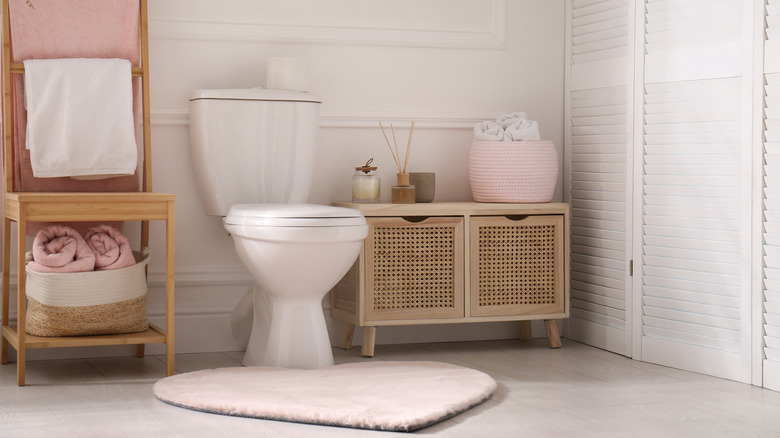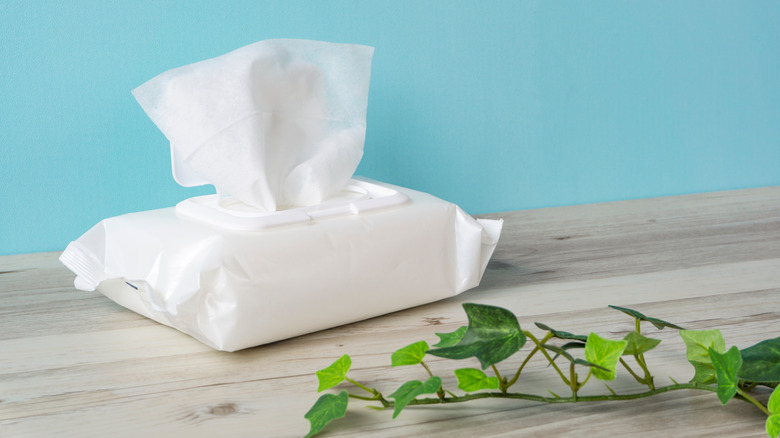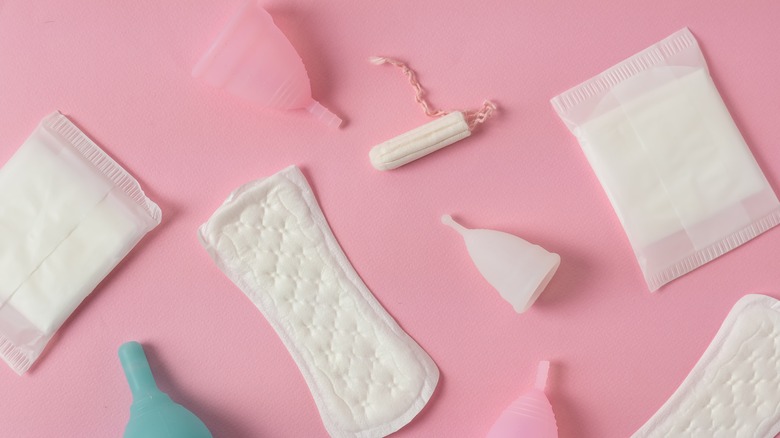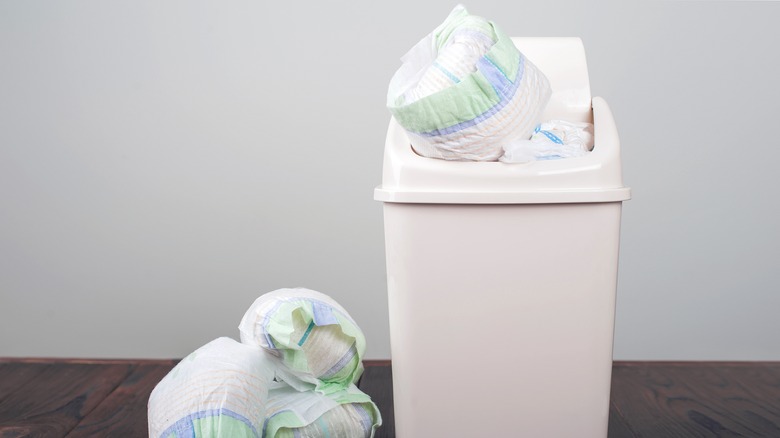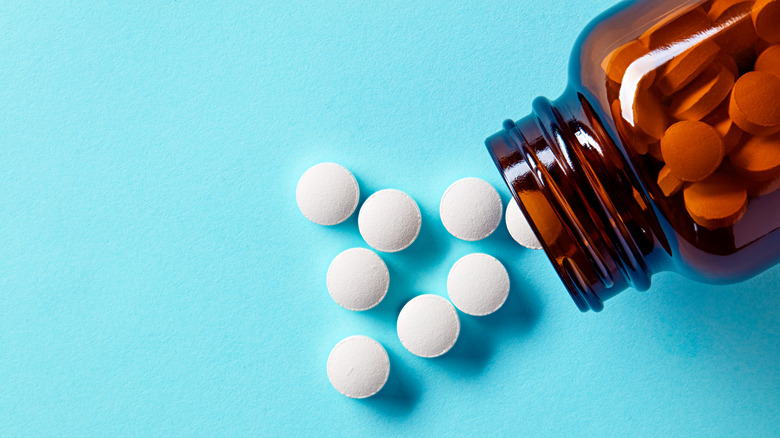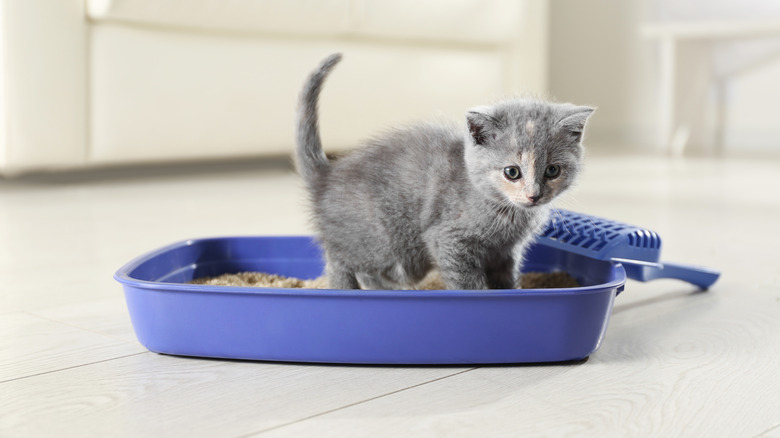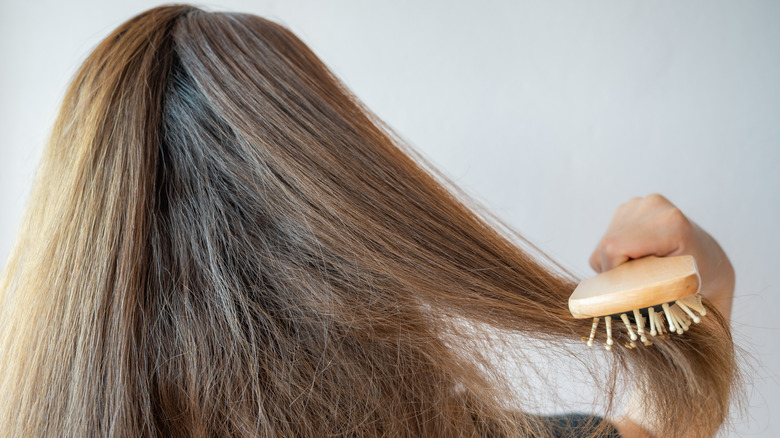6 Things You Should Never Flush Down The Toilet
You may or may not be aware of this, but there are certain things you think you can flush down your toilet that you probably shouldn't. According to Trinity Plumbing, such items include disposable wet wipes, menstrual products, diapers, medication, cat litter, and hair. Unfortunately, most people send these things, and more, into sewer systems, causing clogged pipes and issues with their septic tanks.
Metro Plumbing, Heating and Air says this is one of the top reasons toilets bowls back up, overflow, or breakdown altogether. It can be a costly affair, too, since plumbers charge a flat rate per project or an hourly fee of $45 to $150, via CostHelper. To save money and prevent further damage, consider this simple rule: throw it out, don't flush it down. Keep your toilet clog-free by learning about six everyday items that are not flush-friendly and should not go anywhere near your bathroom or toilet bowl.
Disposable wipes
Sending disposable wet wipes down the toilet often happens in most households due to their similarity to toilet paper and flush-friendly wipes. But per Wastewater Transport Services, wet wipes of any kind definitely shouldn't be flushed down the toilet, even flushable wipes. Regardless of what the manufacturer says, wipes do not belong in the toilet bowl because they do not dissolve as quickly as needed and will likely clog your toilet over time.
According to Trinity Plumbing, disposable wipes will eventually dissolve, but at a slow pace, getting caught on other items and causing build-up. You must know that flushing wipes down the toilet will not only harm your septic tank but also negatively impact our sewage systems, which can ultimately affect an entire community. So it's better to be safe than sorry because all it takes is one time and one wrong item to be flushed down the toilet for clogging to occur.
Menstrual products
Any time you flush menstrual products, you're playing a dangerous game because the manufacturers did not intend for them to be disposed of in such a manner. If you've ever used a public bathroom, the chances are that you've seen a sign imploring you not to flush period items. These messages are advertised because of the assumption that menstrual products are small and can therefore not cause any harm to septic tanks and sewer systems.
According to Trinity Plumbing, because menstrual products like pads, panty liners, tampons, and menstrual cups inflate when they absorb liquid, they are considered a clogging hazard by plumbing experts. These items can hinder the efficacy of your toilet system and force you to shell out between $65 and $250 to have the issue resolved, via CostHelper. Factors such as your location, type of obstruction, and nature of the call (emergency, holidays, weekends, and evenings) can affect the overall cost.
Diapers
This is a no-brainer, but diapers, no matter their brand, should not go anywhere near your toilet bowl. Because one of their primary roles is to soak up water, they can't be broken down by the water in the septic tank, via Wastewater Transport Services. Instead, according to Trinity Plumbing, they tend to get stuck in the septic tank because they expand and become too big and heavy to pass through the pipeline.
The experts over at Natural Baby Life say that if a diaper accidentally falls into a toilet bowl, you can pull it out with a gloved hand, but if it's been flushed, use a grabbing tool, coat hanger, auger, or plunger to attempt to pull it out. Remember that used diapers belong in the trash. If you're away from home and cannot find an appropriate place to dispose of your baby's diapers, wrap it up in a plastic bag and wait until you get home.
Medication
Many people think flushing pills down the toilet is harmless and an excellent way to get rid of medications, mainly because it's common in films, TV shows, and even in books. In fact, per Wastewater Transport Services, you shouldn't ever flush any medication — unless they're on the U.S. Food and Drugs Administration's (FDA) flush list — down the loo. Even though toilet water can dissolve them, it can't absorb them as the body would. So you're essentially creating a toxic environment that can interfere with the degradation processes in septic tanks and sewer systems.
According to Plumbing Solutions, flushed pills can eventually affect water sources and impact the water supply. The effects of this are harmful and toxic, so you want to avoid it at all costs. Fortunately, there are several other ways to get rid of medication that don't include clogging your toilet. The FDA proposes dropping off expired or unused medicines at the take-back site or safely disposing them in the trash.
Cat litter
Cats can't use the bathroom as we can; thankfully, that's why we have litter boxes to prevent unfortunate situations. When disposing of your kitty's litter, always put it in the trash. Wastewater Transport Services say that cat litter is not meant for your toilet because it doesn't produce enough water to pass the litter through the pipes.
According to Plumbing Solutions, cat litter also contains ammonia, which can damage your pipes and overall toilet functionality. You should also never flush your cat's feces down the toilet because it won't break down properly due to contact with the litter. It may seem like the easy way to go because no one enjoys the odor of their cat's litter box or feces, but it's not safe. The Spruce Pets informs that the best way to dispose of cat litter is to double bag the scooped waste, tie it in a secure knot, and put it in the trash.
Hair
Toilets can break down many dissolvable items; however, hair is not on that list. According to House Beautiful, you should never flush your hair down the toilet as it can become easily tangled and get stuck onto things, causing the toilet to back up or overflow. If you've already formed this habit, know that the only way to extricate the clumps of hair from your pipes is to call a plumber. It may be costly, depending on your location and the severity of the issue. This may also be an excellent time to stop this practice to avoid further damage to your toilet.
To get rid of hair, always throw it in the trash so you don't risk clogging your pipes because any toilet can only take so much when non-flush items are constantly being pushed down. Remember to find all the clumps of hair clinging to your drain and get rid of them.
